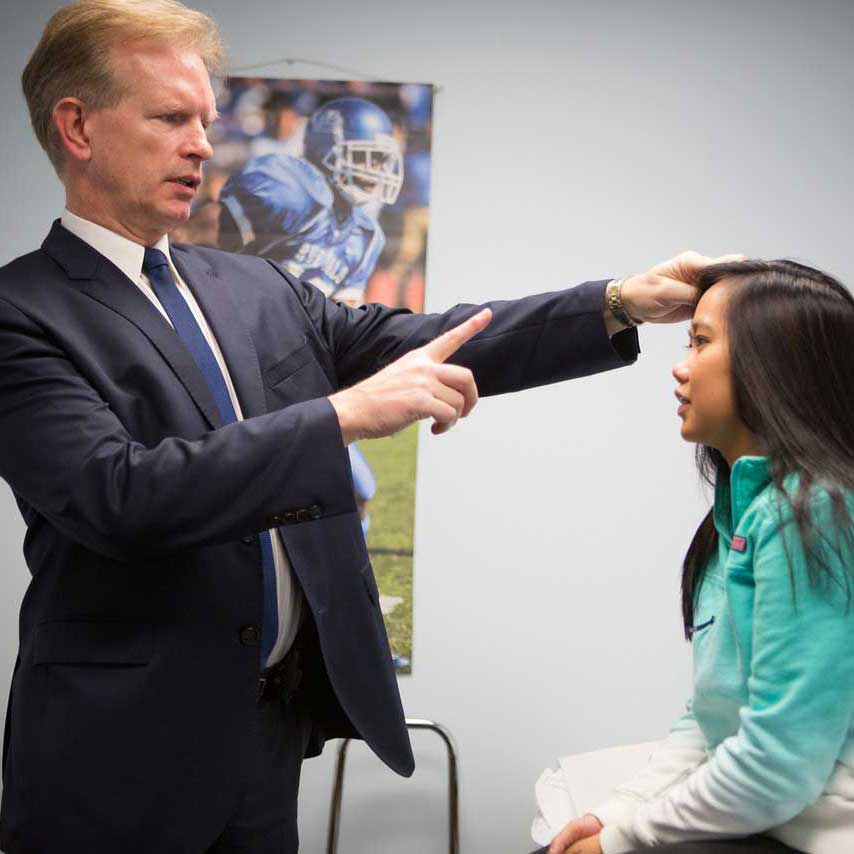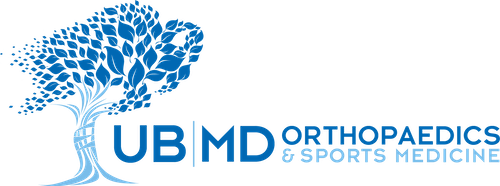Patient Education

Dr. John Leddy performing a concussion-focused clinical exam.
What is a Concussion? What are the risks?
A concussion is a mild injury to the brain. The word ‘mild’ is used to distinguish concussion from the more severe brain injuries that are represented by days of unconsciousness and major motor and cognitive limitations. Mild does not mean concussion can be ignored or not treated.
Concussion, like the more severe types of brain injury, result from external force which causes the brain inside the skull to move. The brain is more like a liquid than a solid so it is quite vulnerable to forced movement. The term ‘concussion’ is usually used in the context of sports, however, it can occur due to any traumatic event that causes force to the brain. A concussion leads to immediate symptoms like headache, dizziness, confusion or eye problems. The initial assessment of a suspected concussion in a sports setting relies on these symptoms for diagnosis, so it is very important for athletes to be honest with their doctor or athletic trainer doing the on-field assessment. Returning to sport while concussed is dangerous and a second injury before the first concussion has healed can cause more serious and sometimes permanent damage.
Along with many frequently asked questions you may have, below are some of the symptoms and risks to consider in relation to concussion.
Typical Concussion Symptoms
Right at the time of injury or shortly after many people will experience any or all of the following:
- Headache
- Dizziness
- Ringing in the ears
- Sensitivity to light
- Sensitivity to noise
- Nausea or upset stomach
- Vomiting
- Memory disturbances or memory lapses
- Difficulty concentrating or retaining new information
- Trouble falling asleep
- Trouble staying asleep
If a person develops new symptoms after going home from the emergency room or doctor’s office, it’s best to once again consult with your physician right away.
Symptoms persisting for more than 2 weeks in adults or 4 weeks in adolescents following the initial injury event is termed Persistent Post-Concussion Symptoms (PPCS). A multidisciplinary approach with directed therapies should be sought in these cases.
Risks Associated with Concussion
Concussions generally do not cause permanent damage. However, in rare instances a concussion can lead to a bleed within the tissue that surrounds the brain. This can be life threatening so it is important that the person with a concussion be watched by others.
Important signs of an internal bleed are:
- Worsening headache
- Continued vomiting – even after returning home
- Increased dizziness or drowsiness
- Increased confusion or disorientation
Most people find that the symptoms of concussion are gone within a few days. However the chemical changes in the brain do not return to normal for at least a week and during this time it is important not to experience another blow to the head.
If symptoms persist for a week or more you should go to your doctor or a concussion clinic for further evaluation. About a third of concussions have symptoms persisting for longer than 1-month, termed PPCS. PPCS should be treated by a knowledgeable health care practitioner. If untreated, it may lead to difficulties at work or school, not to mention considerable discomfort to the person with the symptoms.
Simply stated, if symptoms appear to get worse, get to an emergency department immediately.
For more information or to schedule an appointment with one of our concussion experts, please contact us.
Frequently Asked Questions
Perhaps you’re a parent or a coach of youth athletes and concerned about concussion, Traumatic Brain Injuries (TBI), post-concussion treatment, cognitive testing and more, leaving you confused and dizzy with more questions than answers. The Concussion Management Clinic is here to help.
Let’s start with some basics. These frequently asked questions related to concussion may have the answer you are looking for. If not, please contact our concussion experts for further assistance or to set up an appointment for evaluation and/or treatment.
Blank
What is a concussion?
A concussion is a temporary alteration in awareness or consciousness as a result of a blow to the head. You do not have to lose consciousness in order to experience a concussion. A concussion involves changes in the chemistry of the brain. The chemical changes in the brain last longer than the symptoms so your doctor will recommend that you rest and avoid contact sports for at least a week.
All important aspects of human function are regulated in some way by the brain. A concussion causes a disruption of these regulatory functions, and the patient experiences the concussion in the abdomen (nausea), the heart (irregular heart function), the liver (changes in the metabolism of medications) and the vestibular system (dizziness). Our treatment, for those with prolonged symptoms, is aimed at restoring the regulatory functions of the brain through carefully monitored exercise.
What are typical concussion symptoms?
Some of the symptoms described above will last only an hour or two and others may last longer, up to a week or more. In addition, people with a concussion may develop new symptoms once they go home from the Emergency Room or doctor’s office. Many concussed individuals report trouble getting to sleep or staying asleep. Some also have trouble with irritability. Another delayed symptom is poor concentration, especially for reading.
When will I recover from concussion symptoms?
In some cases symptoms will last longer than a few days. If symptoms persist for a week or more you should go to your doctor or a concussion clinic for further evaluation. In rare cases a person can have symptoms that persist for three or more weeks and this is called “post concussion syndrome”. Post concussion syndrome should definitely be treated by a knowledgeable health care practitioner. If untreated, post concussion syndrome can lead to difficulties at work or school, not to mention considerable discomfort to the person with the symptoms.
What should I watch out for?
headache that appears to be getting worse
continuing to vomit, even after you have returned home
increased drowsiness or dizziness
increased confusion
In simple terms, if your symptoms appear to get worse, go to an emergency department in your local hospital immediately.
Is there treatment for concussion?
If symptoms persist beyond one week, and especially, beyond three weeks, it is wise to seek treatment from your doctor or a specialized concussion clinic. There are various treatments for some of the persistent symptoms of concussion. There are also treatments available for some of the problems that occasionally accompany post concussion syndrome, such as depression.
Blank
Who should I see for follow up care and treatment?
What makes your concussion treatment methods so effective?
We are a pioneering group that uses a scientifically-validated exercise-based protocol to evaluate concussions and to treat post-concussion syndrome. Our method is now the recognized standard in concussion treatment. We also have computerized cognitive testing to help decide when athletes are ready to return to play.
Our concussion treatment program is unique and the most comprehensive in Western New York. Using a multidisciplinary approach it is based on cutting-edge research developed at the University at Buffalo by John Leddy, MD and Barry Willer, PhD Patients will see both a physician and a neuropsychologist. Neuropsychologists specialize in brain and behavior relationships, and they help to assess and manage concussions. This treatment approach is based on a view of post-concussion syndrome as a whole body problem rather than just a problem with the brain. In addition, many patients will take a computer test that measures memory and concentration. Athletes can also take the test before the season to establish a baseline (baseline testing) to serve as a comparison to any future tests.
How do we treat post concussion syndrome?
The treatment approach used at the UBMD Orthopaedics & Sports Medicine/University at Buffalo Concussion Management Clinic is based on a view of post concussion syndrome as a systemic problem rather than just a problem with the brain. All important aspects of human function are regulated in some way by the brain. A concussion causes a disruption of these regulatory functions and the patient experiences the concussion in the abdomen (nausea), the heart (irregular heart function), the liver (changes in the metabolism of medications) and the vestibular system (dizziness). Our treatment, therefore, is aimed at restoring the regulatory functions of the brain through carefully monitored exercise. Exercise has been shown to improve people who suffer from depression. Exercise has also been shown to reduce the effects of aging on brain function and increase longevity.
When athletes are assessed for readiness to return to play after concussion they are put through an exercise routine to see if raising blood pressure and heart rate will bring on concussion symptoms. If concussion symptoms reappear then the athlete is not considered safe to return to the sport. Generally athletes who are not ready to return to their sport are told to go home and rest or are prescribed medications. Our approach is to evaluate the level of exercise that produced symptoms (called the threshold) and then prescribe a monitored exercise program that is sub threshold (and therefore does not bring on symptoms). Our approach has been very beneficial for our patients and we are now conducting research on this approach that will help further identify how and why this treatment approach works.
What is post concussion syndrome?
There is some disagreement among health care professionals as to what exactly constitutes post concussion syndrome. In a review of the literature we attempted to provide a definition that made sense to our patients and our colleagues. We suggested that post concussion syndrome is characterized by symptoms of concussion persisting for a period of at least six weeks.
The symptoms of concussion do not normally last beyond two weeks. When symptoms do persist it suggests that the metabolic changes of concussion have not been corrected. This persistence of symptoms is called post concussion syndrome. We suggested a six week period of persisting symptoms to be conservative but we actually start to treat people for post concussion syndrome as early as three weeks post injury. The most common persisting symptoms are fatigue, headache, reduced memory and/or depression.
There is some argument whether there is such a thing as post concussion syndrome. Some researchers and some health care practitioners assume as fact that most people recover from concussion and those that do not have other issues such as a desire to be seen as ill, or perhaps have depression. This disagreement over post concussion syndrome is possible because the brain is so difficult to examine while the person is still alive and it is hard to prove that subtle changes in behavior or thinking patterns are the result of changes in the brain. However, more recent research finding support that persistent symptoms are associated with specific changes in brain function and physiologic changes such as heart rate variability.
Is our clinic just for athletes?
We have used controlled exercise as a treatment for post concussion syndrome with athletes and it was very effective. We have also used the approach with non-athletes and it has worked as long as the individual is prepared to improve their health through exercise.
For more information or to schedule an appointment with one of our concussion experts, please contact us.
